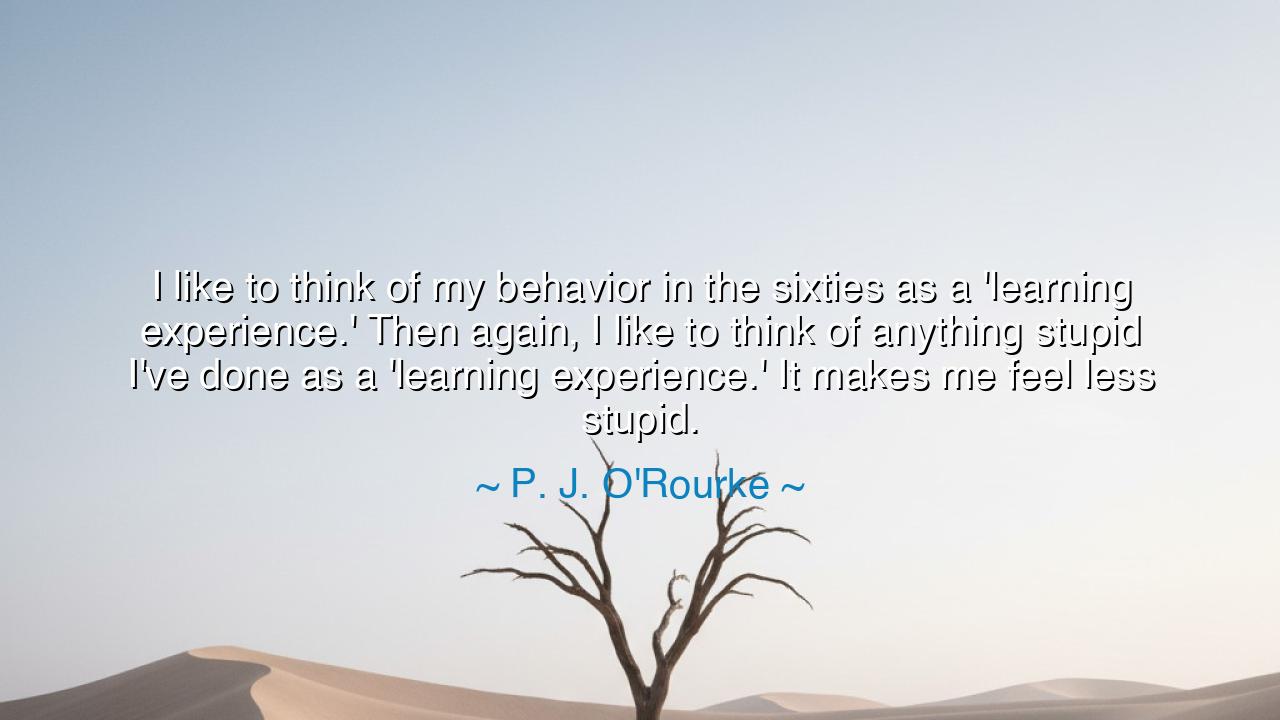
I like to think of my behavior in the sixties as a 'learning
I like to think of my behavior in the sixties as a 'learning experience.' Then again, I like to think of anything stupid I've done as a 'learning experience.' It makes me feel less stupid.






Hear the jester-philosopher speak with a wink and a torch: “I like to think of my behavior in the sixties as a ‘learning experience.’ Then again, I like to think of anything stupid I’ve done as a ‘learning experience.’ It makes me feel less stupid.” In this jest from P. J. O’Rourke there is more than laughter; there is a medicine for the soul. He names a craft as old as shipwrecks and as new as today’s headlines—the art of changing shame into schooling. The fool who keeps dancing in the same ditch is merely a fool; the fool who kneels, studies the ditch, and charts the next path is becoming a sage.
To call folly a learning experience is not to polish sin into virtue; it is to wrestle meaning from the mud. The sixties, full of thunder and bright mistakes, taught a generation that conviction without discipline is a wildfire. O’Rourke’s line does not excuse missteps; it exiles them to the past by extracting their lesson. Thus the jest hides a blade: name your error, harvest its wisdom, and it loses the power to own you. You may still blush, but you are no longer bound.
In the schools of the ancients, apprentices were allowed to blunder under watchful eyes. The blacksmith’s first warped blade was not discarded as stupid; it was nailed above the forge as a teacher. So too with life: we can frame our rough work in a gallery of remembrance and call it “study,” or we can shove it into a cellar and let it rot. O’Rourke chooses the gallery, and by doing so he feels less stupid—not because the deed was wise, but because the heart has grown wise around it.
Consider a tale from the age of exploration. Ernest Shackleton failed to reach his Antarctic goal; his ship, the Endurance, was trapped and crushed by ice. By one measure, this was folly—too bold, too late in the season. But from the wreck he forged a curriculum of survival: rationing, leadership, morale, timing. He ferried his men through lethal seas to safety, and the failed expedition became a lantern for future explorers. In the ledger of glory, he “lost”; in the ledger of learning, he became immortal. This is the transmutation O’Rourke jokes about: the alchemy that turns defeat into instruction.
Let us also weigh a civic example. The Great Smog of London in 1952 and the Cuyahoga River fire of 1969 were national embarrassments, branded as stupid failures of stewardship. But when citizens and lawmakers reframed them as learning experiences, they built the Clean Air and Clean Water Acts, rewrote industrial practice, and taught children another way to breathe. A nation that can laugh at its past and legislate its future feels less stupid because it has grown more careful. The joke ends in law; the smirk becomes a standard.
The core of the aphorism is this: self-compassion is not self-deception. We do not erase the bruise; we read it. To say “learning experience” is to refuse the twin poisons of denial and despair. Denial says, “It wasn’t stupid”; despair says, “I am stupid.” Wisdom says, “It was stupid, and now it is mine to master.” In that sentence, humor is a bridge strong enough to carry truth across the river of pride.
Carry, then, these practices like coins in your pocket. (1) Name the misstep precisely—no fog, no flourish. (2) Extract the rule—what would have prevented it; what will prevent its kin. (3) Ritualize the fix—checklists, calendars, budgets, accountability partners. (4) Archive the lesson—write it where future-you will trip over it before repeating the past. (5) Laugh kindly at yourself—humor keeps the heart supple and the door to improvement open. In this way, every stumble is taxed for tuition; every bruise pays for a stronger stride; and you, like O’Rourke, will feel less stupid not by pretending to be perfect, but by becoming a better student of your imperfect days.
So let the counsel stand: call your follies learning experiences, not to gild them, but to gut them and claim their marrow. The wise do not walk unscarred; they walk instructed. And if you can lace instruction with laughter, the road grows lighter, your companions braver, and even the ghosts of the sixties will nod from the roadside, pleased that your behavior—once reckless—has become a compass pointing home.






AAdministratorAdministrator
Welcome, honored guests. Please leave a comment, we will respond soon